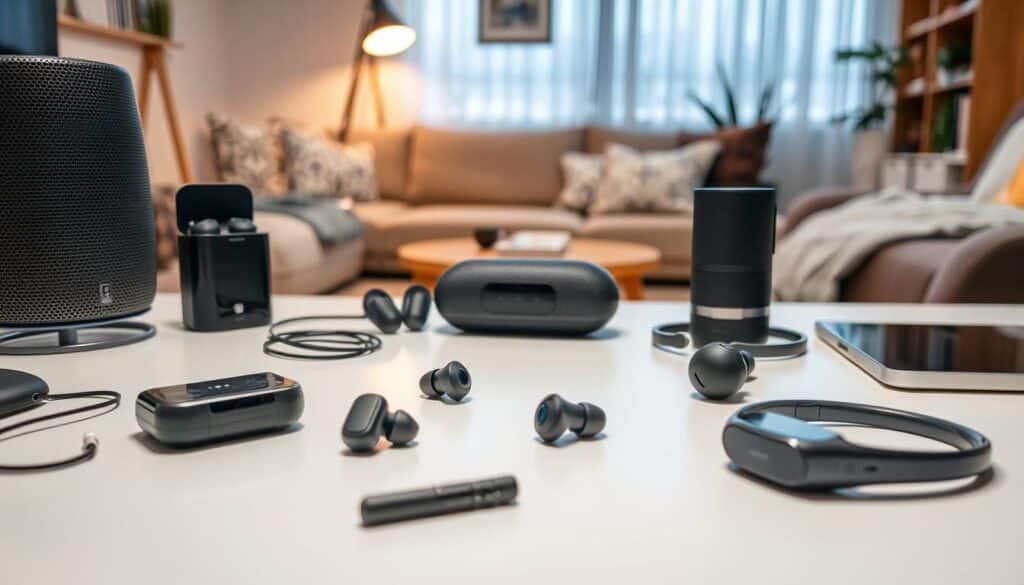Smartphones are now a big part of our lives, making it easy to stay connected and find information. But, using them too much can be bad for our health. This includes risks from radiation and how they affect our bodies and minds Smartphone Can Harm Your Health.
This article will look at how smartphones can harm us. We’ll cover the risks and give tips on how to use them safely. We want to help you understand the dangers and stay healthy in our digital world.
Key Takeaways
- Smartphones emit radiofrequency energy that can potentially impact human tissue and health
- Excessive smartphone use can lead to physical issues like poor posture, eye strain, and reduced physical activity
- Overuse of smartphones, especially by children and teens, can negatively affect mental well-being and social development
- Health organizations have raised concerns about the possible links between smartphone radiation and certain health conditions
- Adopting practical safety measures, such as reducing exposure and following usage guidelines, can help mitigate the risks associated with smartphone use
Understanding Mobile Phone Radiation and Its Effects
Smartphones send out radiofrequency (RF) energy, a type of non-ionizing electromagnetic radiation. The amount of radiation you get depends on your phone, how close you are to it, and how often you use it. The FDA says there’s no proof that RF energy harms health, but some worry about long-term effects.
Types of Radiation Emitted by Smartphones
Smartphones release non-ionizing electromagnetic radiation. This is not the same as ionizing radiation from X-rays or nuclear reactions. The non-ionizing radiation, like radiofrequency energy, can’t directly harm DNA or cells.
How Radio Frequency Energy Affects Human Tissue
The specific absorption rate (SAR) shows how much cell phone radiation your body absorbs. The FDA and others say there’s no clear link to health problems. Yet, some studies hint at a link to brain activity and a slight risk of certain tumors.
Measuring Radiation Exposure Levels
The FCC sets limits on cell phone radiation to keep us safe. Phone makers must test their devices and report the specific absorption rate (SAR). This tells us how much radiofrequency energy is absorbed by the body.
“Over nearly 30 years, scientific studies have not linked exposure to radio frequency energy from cell phones with health issues such as cancer.”
Smartphone Can Harm Your Health: Research-Based Evidence

Research has been ongoing about the health risks of cell phone use. In 2011, the International Agency for Research on Cancer (IARC) said mobile phone radiation might cause cancer. Some studies don’t show a clear link to brain tumors, but others suggest risks.
The INTERPHONE study, a big international effort, couldn’t prove a direct link to brain cancer. But the Danish cohort study found a possible link between long-term cell phone use and glioma, a brain tumor.
New studies show cell phone use has gone up, but brain cancer rates haven’t. The National Toxicology Program (NTP) studied rodents and found no health effects from radio frequency radiation.
Despite mixed results, the IARC still says mobile phone radiation might cause cancer in humans. More research is needed, especially since more young people use smartphones.
Cell phone ownership in the U.S. rose from 62% in 2002 to 96% in 2019 according to the Pew Research Center.
The International Agency for Research on Cancer (IARC) concluded that the evidence suggests Radio Frequency-Electromagnetic Radiation (RF-EMR) from cell phones is “possibly carcinogenic to humans.”
Experts still debate the risks, but they suggest precautions. Limit calls, use hands-free devices, and keep phones away from your body to reduce exposure.
Brain-Related Health Concerns from Cell Phone Usage

Smartphones are everywhere, raising worries about their effect on our brains. Research shows they can change how our brains work, how fast we react, and how well we sleep. Some studies say they might not increase the risk of certain brain tumors, but others suggest there could be risks.
Impact on Brain Activity and Function
Too much screen time can harm our brains. Adults who spend too much time on screens, especially young ones, might see their brains change. This can affect their memory and thinking skills.
Watching TV for hours a day can also raise the risk of serious brain diseases. These include dementia, stroke, and Parkinson’s.
Connection to Brain Tumors and Cancer Risk
The American Cancer Society says cell phones might not cause brain tumors, but more research is needed. Lab animals exposed to radio waves from phones have shown higher risks of heart tumors. But it’s not clear if this applies to humans.
In 2018, big studies found lab animals had higher risks of tumors from RF waves.
Effects on Sleep Patterns and Mental Health
Too much screen time can mess with our sleep. It can delay when our bodies make melatonin, making it hard to fall asleep. People who can’t stop using their phones might have less brain matter, which is important for moving, remembering things, and feeling emotions.
Using phones too much can also stress us out. This can lead to too much cortisol, causing anxiety and other health problems.
As research on cell phones and health keeps growing, it’s clear we need to use them wisely. This is key for keeping our brains healthy and feeling good overall.
Physical Health Impacts of Excessive Smartphone Use
Using smartphones too much can harm our bodies. One big problem is text neck syndrome. It happens when we bend our necks a lot while using phones. This can cause neck pain, stiffness, and even affect our spine over time.
Digital eye strain, or eye strain, is another issue. It comes from staring at phone screens for too long. Symptoms include dry eyes, blurry vision, headaches, and can even harm our corneas.
Smartphones can also cause ergonomic problems. The constant use can lead to trigger thumb, nerve irritation, and other muscle issues. These problems can really affect our daily lives.
Using phones while driving is very dangerous. It can make you 23 times more likely to crash if you text. Even talking on the phone can increase your risk of an accident by 4 times.
| Impact | Statistic |
|---|---|
| Text neck syndrome | Caused by poor posture and constant neck bending while using mobile devices |
| Digital eye strain | Extended exposure to blue light from smartphone screens can cause dry eyes, blurred vision, and headaches |
| Ergonomic issues | Repetitive motions and prolonged inactivity can lead to trigger thumb, ulnar nerve irritation, and musculoskeletal problems |
| Distracted driving | Texting while driving increases the risk of crashing by 23 times, and talking on the phone increases the risk by 4 times |
It’s important to deal with these health problems caused by too much phone use. Knowing the risks and taking steps to stay safe can help. This way, we can avoid serious health issues in the long run.
Children and Teens: Special Risk Considerations
The digital age has made smartphones and mobile devices very common among kids and teens. This has raised concerns about the risks of too much screen time and radiation. These issues are especially worrying for young people.
Developmental Concerns for Young Users
Studies show that kids and teens might face health risks because of their still-growing bodies. The World Health Organization (WHO) wants more research on how this affects them. Too much screen time can lead to emotional and behavioral problems, and it can also hurt sleep.
Guidelines for Parents and Caregivers
- Make a family plan to control screen time and find better activities.
- Don’t let kids use screens before bed to keep their sleep good.
- Support face-to-face interactions and activities that don’t involve screens.
- Keep an eye on how much and what kind of screen time kids have.
Age-Appropriate Usage Recommendations
Experts say toddlers and preschoolers should watch screens for no more than an hour a day. Older kids and teens should try to keep their screen time under two hours. Finding a balance between digital and non-digital activities is key to keeping kids healthy.
“Excessive screen time has been linked to poor sleep, risk factors for cardiovascular diseases, impaired vision, reduced bone density, depressive symptoms, and suicidal thoughts in children and adolescents.”
International Health Organizations’ Stance on Mobile Phone Safety

Smartphones are becoming more popular around the world. Health groups are watching how they might affect our health. The World Health Organization (WHO) is especially careful about the health risks of mobile phone radiation.
The U.S. Food and Drug Administration (FDA) says there’s no clear link between cell phones and health problems. This is true as long as we follow the Federal Communications Commission (FCC)‘s safety rules. The FCC sets limits for how much radiofrequency we can be exposed to.
The International Agency for Research on Cancer (IARC) is part of the WHO. It says cell phone radiation might be linked to cancer. This means we need to keep studying and being careful about using our phones.
| Organization | Key Stance on Mobile Phone Safety |
|---|---|
| World Health Organization (WHO) | Continues to assess the health impact of RF fields, including those emitted by cell phones. |
| U.S. Food and Drug Administration (FDA) | Believes current scientific evidence has not linked RF energy exposure from cell phones to health problems at or below FCC-set exposure limits. |
| Federal Communications Commission (FCC) | Sets the radiofrequency exposure limits for cell phones and other wireless devices. |
| International Agency for Research on Cancer (IARC) | Classifies cell phone radiation as a “possible human carcinogen,” indicating the need for further research and precaution. |
These big health groups keep telling us to keep researching and be careful. They want us to think about how our phone use might affect our health.
Practical Safety Measures for Smartphone Users

Smartphones are everywhere, and it’s key to think about safety. Simple steps can help lower health risks from these devices. By using smart strategies, users can cut down on the radiation they get from phones.
Distance and Exposure Reduction Tips
Using hands-free devices like headsets is a smart move. It keeps your head away from the phone, reducing radiation. Also, try to text instead of call, as it’s safer for your body.
Best Practices for Daily Usage
There are easy ways to stay safe with your phone. Don’t use it in weak signal areas, as it can up radiation. Also, keep your phone off your body at night and use “airplane mode” when not in use.
Protective Accessories and Their Effectiveness
Some protective accessories say they block radiation, but it’s not always true. Always check the science behind them. Look for phones with low Specific Absorption Rate (SAR) to lower radiation exposure.
By following these tips, you can use your phone safely. It’s all about making smart choices to protect yourself from phone-related health risks.
Also Read : Quick And Healthy Breakfast Ideas To Energize Your Morning
Conclusion
The debate on health risks from smartphones is ongoing. Yet, it’s wise to be cautious. Balanced and mindful use of smartphones and following safety tips can help reduce risks. As technology advances and more studies come out, we’ll learn more about digital wellness.
It’s important to keep up with the latest research and health advice. This helps us use smartphones wisely in our connected world. As ongoing research reveals more, we should adjust our habits to focus on our well-being.
Being aware of health risks and using safety measures is key. This way, we can enjoy smartphones’ benefits while protecting our health. By finding a balance, we can use these devices safely and healthily.
FAQs
Q: What does the latest study say about the effects of cell phones on health?
A: The latest studies indicate that there may be a link between cell phone use and brain tumors. Researchers found that frequent phone users could be at an increased risk for glioma, a type of brain cancer, particularly if they have been exposed to microwave radiation for many years.
Q: Can cell phones harm my health if I use them frequently?
A: Yes, many studies have suggested that cell phones could harm your health. The analysis conducted by Hardell et al. in 2015 noted a potential tie between long-term cell phone use and an increased risk for certain types of brain tumors.
Q: What do researchers recommend for phone users to stay safe?
A: Experts recommend limiting the duration of phone use per day and using hands-free devices to minimize exposure to radiation. They also suggest keeping cell phones out of your pocket to reduce potential risks associated with microwave radiation exposure.
Q: Is there a case-control study that supports the risks of cell phone use?
A: Yes, several case-control studies, including those conducted by Morgan and Carlberg, have identified a possible increased risk of brain tumors associated with long-term, frequent cell phone use.
Q: Are there any specific behaviors that promote safer phone use?
A: To promote safer phone use, consider using speaker mode, limiting calls to shorter durations, and taking regular breaks from your device. These behaviors can help reduce the amount of time you are exposed to radiation.
Q: How can I replace my cell phone addiction with healthier habits?
A: To replace cell phone addiction, you can set specific times for phone use, engage in outdoor activities, or pursue hobbies that do not involve screens. This can help mitigate the potential harmful effects associated with frequent phone use.
Q: What is the significance of the term “possibly carcinogenic” in relation to cell phones?
A: The term “possibly carcinogenic” refers to findings from studies that suggest a link between cell phone use and cancer, but where conclusive evidence is still being debated. The International Agency for Research on Cancer has classified radiofrequency electromagnetic fields as possibly carcinogenic to humans based on the evidence.
Q: How often should I check my phone to avoid potential health risks?
A: It is advisable to minimize checking your phone frequently throughout the day. Experts recommend limiting screen time and taking breaks to reduce the overall exposure to microwave radiation associated with cell phone use.
Q: Are there alternative communication devices that are safer than cell phones?
A: Yes, alternatives such as landlines or text messaging can reduce exposure to microwave radiation. Using communication devices that do not require close contact with your head may promote safer interaction.
Source Links
- https://www.theguardian.com/lifeandstyle/2024/jan/10/smartphone-screentime-good-bad-expert-advice
- https://www.yahoo.com/lifestyle/safe-keep-cellphone-pocket-experts-235634131.html
- https://www.cancer.gov/about-cancer/causes-prevention/risk/radiation/cell-phones-fact-sheet